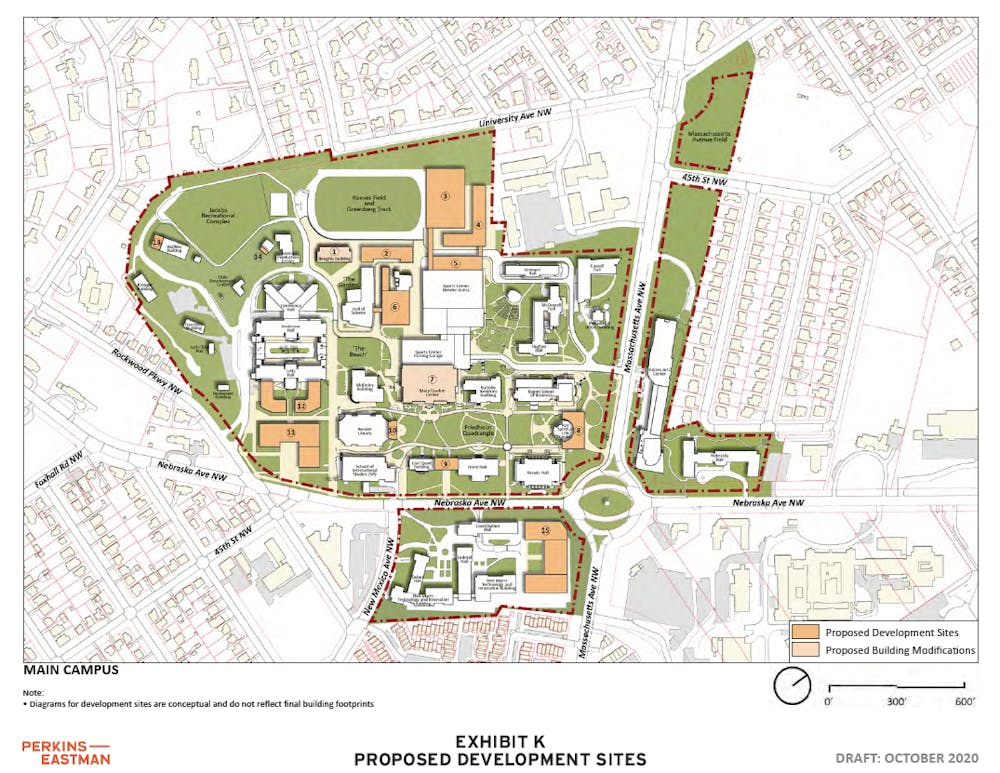Correction: This article has been updated since it was first published to correct that Jessica Herzstein did not inherit the residence adjacent to Jacobs Field from her father; she bought it.
American University released an updated draft on Oct. 27 of its 2021 campus plan, including consideration of a sound barrier along Jacobs Field and renovations to Mary Graydon Center.
The Blackprint reported on Oct. 29 that these proposed renovations include replacing Roper Hall, which was previously identified as an area where the University would provide Black affinity housing.
The 264-page document received approval from the AU Neighborhood Partnership, a coalition of representatives from communities near the University’s campus. According to Troy Kravitz, the co-chair of the partnership and an Advisory Neighborhood Commission 3D commissioner, the forum addresses communication issues between nearby residents and the University that former plans did not.
“The previous campus plans have not really resulted in a good product for the community,” Kravitz said. “Now the University is right there alongside community members and talking through issues that arise and devising solutions or ways to mitigate the impacts if that’s what is necessary.”
One way the University is seeking to mitigate student impact on surrounding areas is by encouraging more undergraduates to remain on-campus during their time in the District. The plan proposes renovations to existing housing as well as building additional spaces for student living. According to the plan, the University will add up to 500 new beds to campus, which means that if enrollment increases, AU will continue to supply housing to the required 67 percent of full-time undergraduates.
Ed Fisher, AU’s assistant vice president of community and government relations, said in a statement to The Eagle that AU’s 2021 Draft Campus Plan does not eliminate Black affinity housing.
“Since campus plans are merely outlines of proposed development, they do not include specificity regarding the types of housing (affinity, living-learning, etc.) or academic programs that may be planned for new buildings,” the statement said. “The existing services and/or facilities will ultimately be relocated to existing or new university facilities as part of the planning process.”
However, Fisher did not specify where the University will move the planned affinity housing.
According to the draft, MGC will undergo extensive interior renovations intended to increase its use as a “hub of student life and activity.” The proposed upgrades emphasize increasing spaces for increased health and wellness programs but don’t plan to expand or alter MGC externally.
AU is proposing potential external changes to Bender Library and Kay Spiritual Life Center. The draft doesn’t go into much detail, identifying plans for a “modest addition” to the library and an expansion of Kay to provide extra programming and service spaces.
Throughout the drafting process, some residents expressed frustration at the lack of specificity in other areas of the plan. Kravitz said that many nearby residents campaigned for the inclusion of enrollment projections, but the neighborhood partnership did not consider it productive to provide these numbers.
“Those projections have not been particularly accurate … we can create the illusion of precision again here, but it hasn’t served us in the past and it’s not going to serve us in the future,” Kravitz said. “Instead, let’s actually create a structure where we can actually deal with the impacts that we already know about and the ones that arise in the future.”
Nearby residents were successful in slightly reducing the University’s proposed enrollment cap, according to the plan. To comply with an update to D.C. Zoning Regulations on how students must be counted, the University widened the scope of its 2011 campus plan enrollment cap in the 2021 draft. Community members then bargained with AU for a more limited approach in terms of how much the 2021 campus plan enrollment cap would increase. Compared to the adjusted 2011 cap, this draft plan proposes an enrollment ceiling that is 119 students lower.
The campus plan specifies that the University did not meet its 2011 goal of increasing graduate enrollment by 1,000 students over the subsequent decade. In fact, overall enrollment remained relatively consistent.
Though that enrollment goal was not met, Fisher pointed out that the majority of AU’s goals were met, including the construction of the Washington College of Law and East Campus.
Despite the accomplishments of the previous plan, the Herzstein residence, directly adjacent to Jacobs Field, said it has been battling the University over sound issues for decades.
Jessica Herzstein bought the property from her father, Robert Herzstein, who owned the home for 30 years. She said that over her childhood, AU began to develop the area into an intramural and then intercollegiate field, and noise levels increased. In a 2011 Eagle article about that decade’s campus plan, Robert Herzstein likened the noise from practices to a “war zone.” Eventually, Robert Herzstein hired sound engineers to measure the noise levels from inside his home, who determined that the sound coming from Jacobs Field exceeded the limit set by D.C. law.
Jessica Herzstein said the measures taken to reduce the amount of noise have not been adequate, citing the use of shot clocks during games and other amplified sounds. However, she expressed optimism that a science-based solution could be reached soon.
“I think we both need to compromise,” Herzstein said. “But whatever mitigating factors are brought to play will require continued oversight.”
The University is currently working with Herzstein and other residents near Jacobs Field to develop a sound barrier wall that would run between her residence and the campus border, according to the updated draft plan.
According to Fisher, campus leaders are reviewing the 2021 campus plan alongside ANC3D and ANC3E commissioners, and a vote from them is expected to occur in November. If the plan is approved by both ANC commissioners, the plan will be filed with the D.C. Zoning Commission later this year for review and public hearings, which are likely to begin in early 2021.





